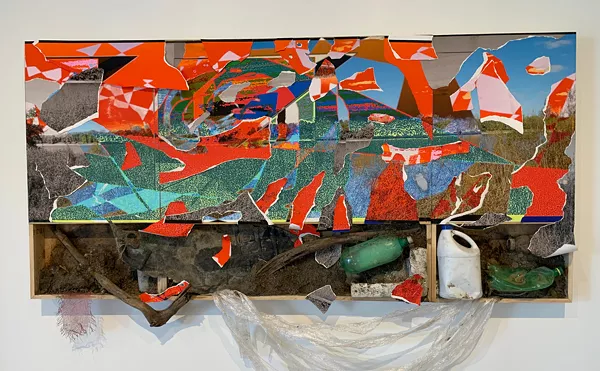Anyone who recalls the Black Rep's 2005 staging of Intimate Apparel knows that Lynn Nottage is a playwright of sensitivity and nuance. She cares deeply about the "unsettled souls" of her characters and also about the worlds they inhabit. Somewhere in the recesses of this dramatist dwells a historian. Nottage's developing talent was confirmed last year when she won the Pulitzer Prize for her most recent drama, Ruined. Now one of her earliest works is on view at Mustard Seed Theatre. Crumbs from the Table of Joy, from 1995, is the gentle memory play that established Nottage as a playwright of promise.
Critics have likened its plot to Betty Smith's beloved 1943 novel A Tree Grows in Brooklyn, and there are external parallels: Both coming-of-age stories are set in Brooklyn; each builds to a lonely girl's high school graduation. There's even a downed tree in both tales. But it might be that as she wrote Crumbs from the Table of Joy, Nottage was more beholden to Lorraine Hansberry than to Betty Smith, for there also are similarities here to A Raisin in the Sun, Hansberry's watershed account of a black family coping with poverty and prejudice. Like Hansberry, Nottage even extracted a line from a Langston Hughes poem for her play's title.
But here's one big difference. Crumbs relies on a narrator, a theater convention that almost ensures that the dramatic fireworks are going to be intermittent. The story is parceled out by our protagonist, seventeen-year-old Ernestine Crump (Alexis White). Displaced from her Florida home and now living in Brooklyn, Ernestine's only real friend is her younger sister (Tyler White). She prefers the imaginary company of Joan Crawford and Bette Davis. The movies offer Ernestine a needed respite from the harsh reality of her mother's recent death and her father's austere ways.
The family's somber routine will be disrupted, first when Ernestine's blowsy aunt Lily, whose politics are as brazen as her peccadilloes, unexpectedly descends upon the cramped Crump basement apartment, and again when a strange foreigner (Jill Ritter-Lindberg) tosses the family's insularity into upheaval. Crumbs may be an early play, but its ambitions are full-blown. Not only is Nottage dealing with racial prejudice in the early 1950s, but she also explores the residue of fear left over from World War II, the lingering distrust between American and alien.
Thanks to a vital performance by Chauncy Thomas, Godfrey, the severe father, is revealed as a mass of contradictions. A night-shift baker who must suffer in silence the insults from his white coworkers, Godfrey expects his children to share his pain. His wife's death has so tilted Godfrey's ordered world that he lives in mental paralysis. He wastes countless hours writing questions to Father Divine, whose framed photo (much too large for this set) hangs on the living-room wall. (In reality, Father Divine was a spellbinding preacher who claimed to be God. Songwriter Johnny Mercer once told an interviewer that his classic song lyric, "You've got to accentuate the positive and eliminate the negative," came from one of Father Divine's sermons.)
The timid Godfrey is Alpha to his sister-in-law's Omega. And indeed, Lily is the living end, a veritable Life Force. Patrese McClain all but devours the furniture in an assured, hedonistic performance that is delicious to watch. But Lily is so tumultuous a character that when her role diminishes in Act Two, the play diminishes with her.
Director Linda Kennedy plays to her strengths, which here are the performances of brother- and sister-in-law. But she might have paid more attention to the sound cues, indicators of the 1950s, which are too muted here to fill out the action as Nottage intended. Then there is this concern: The Fontbonne University black box theater is capricious. Sometimes the acoustics are crystal clear; other times (anyone remember Bat Boy?) the stage's proclivity for swallowing voices is unrelenting. For this production it's best to sit in the center section rather than on the sides.





